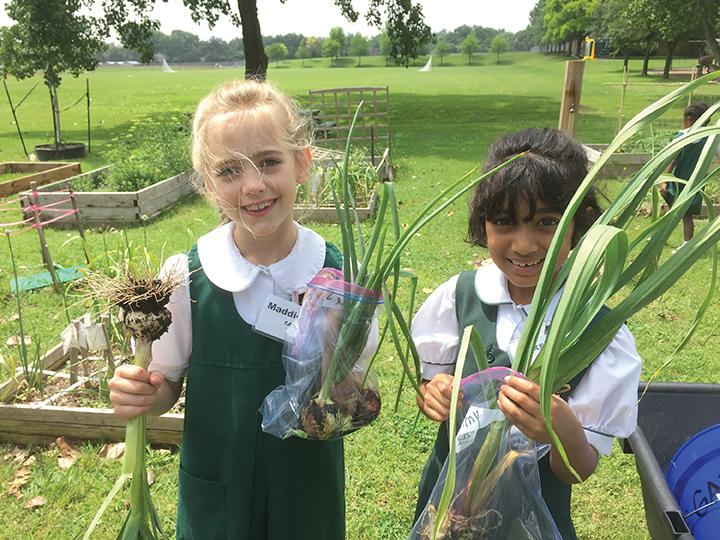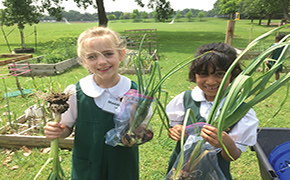With students’ year-long project disrupted, Lower School loses learning opportunity
It’s a gorgeous Sunday afternoon. Lower School science teacher Lara Guerra stops by Hockaday to check on the Lower School garden that she oversees. She expects to see the evidence of her students’ hard work and the bright red of the garden’s biggest plant: a chard. Instead of beauty, she finds destruction.
On April 19, the garden was harvested without permission. The chard and other plants growing under the students’ care for over a year were gone. Now, only half the chard remains. Sections of its stalk were thrown into the compost heap, as if they were trash.
“I was truly shocked,” Guerra said. “I thought, ‘How could anybody do this?’”
Established approximately 10 years ago, the Lower School garden has a rich history. Ever since Lower School music teacher Danny Keller used his Prentiss Grant to travel to the Edible Schoolyard—a garden project started by chef Alice Waters at Martin Luther King Jr. Middle School in Berkeley, Calif.—Keller was inspired and hoped to start a garden of his own.
But Keller never had the opportunity to start the garden; he passed away shortly after his trip. In honor of his memory, his friends donated about $500 to the Lower School for the purpose of starting one. A committee was formed and the money was used to purchase four raised plant beds.
“We’ve added a lot more since then,” Guerra said. “We had four more square beds added when the last Lower School head left.” On May 9, 2015, six more beds were added.
Last year, the garden was put under the supervision of the Lower School science department, and Guerra was put in charge. This is the first school year in which the Lower School has had an official time set aside for the students to use the garden.
The garden is currently in use by first and second graders once every six-day rotation during the students’ flex period. During this time, the students tend to their own square footage of soil and rake leaves to put in the compost heap.

The garden is not only a fun activity for the students but a learning opportunity as well—the students learn about the cycle of life, as well as the science behind the plants in and around the garden.
These lessons inspired the family of first-grader Abigail Everett to start a garden at home, where she and her father Scott Everett have their own chard, among other vegetables. In the Hockaday garden, Abigail grows onions, which were left untouched by the vandal. Abigail enjoys planting and learning from Guerra, adding that “science is one of [her] favorite subjects.”
“I think it’s a shame that someone would just destroy all the girls’ hard work like that,” Scott Everett said. “Abigail and I come up here very often, and I’m just shocked someone would do such a thing.”
Dallas police officer Stephen Williams, who is currently stationed at Hockaday, was disappointed by the news.
“When someone violates the hard work you put into something, it’s upsetting,” Williams said. “It makes you feel like you did your work for no reason. It’s disrespectful.”
The culprit has not been found yet, but Security Department Head Karyn McCoy doesn’t believe the vandal acted out of malice, or they wouldn’t have put the unusable chard parts in the compost heap. If it was a stranger to Hockaday, McCoy believes the security team would have noticed them immediately. As of today, the culprit has yet to be found.
McCoy remains hopeful that the vandalism of the garden was a one-time act, as it has never happened before.
Prior to the incident, the only security measures in place concerning the garden were the regular patrols around the campus that security takes, but Guerra hopes to put a fence up around the garden, something that McCoy sees as plausible. Guerra also plans to display more signs around the plants, to make clear that the plants are not for public harvesting.
Guerra had initially aspired to cook frittatas for her students during a cooking class with the red chard, but due to the lack of ingredients, she will now have to settle for a small salad. Even then, Guerra will have to struggle to stretch supplies over all six classes.
“Everyone should feel a loss from this,” McCoy said. “It’s not just the lettuce or the tomatoes that are lost. It’s the opportunity to teach.”
– Amanda Kim – Asst. Arts & Entertainment Editor –








